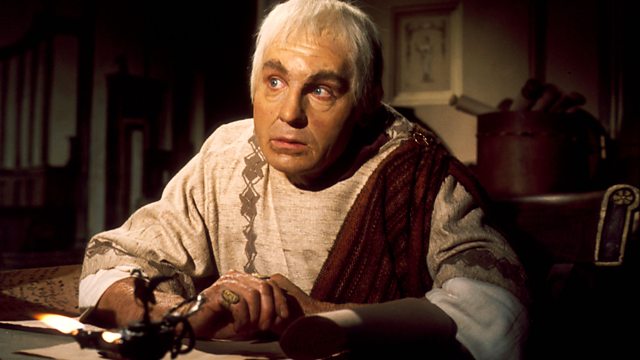I, Claudius
Episode 2: Waiting in the Wings

Sir Derek Jacobi stars as Claudius in the 1976 BBC television adaptation of the Robert Graves novel I, Claudius and the God.
We open with elderly Claudius finding an old letter from Livia to Tiberius, telling him that her requests for his return to Rome from banishment have been denied by Augustus — still furious over his daughter Julia being struck by Tiberius (after she questioned his heterosexuality and insulted his ex-wife).
At Julia’s seaside estate in Antium, the boy Claudius experiences a bloody moment of foreshadowing, when an eagle drops an injured wolf cub into his shaking hands, as his mother Antonia, aunt, siblings and cousins look on. Julia’s seer Domitius interprets the wounded animal as a divine message, and explains what it portends for Claudius:
Domitius: “The wolf cub is Rome. No doubt of it. Romulus was suckled by a wolf as her own cub, and Romulus was Rome. Look at it, all torn about the neck, and shivering with fear. A wretched sight. Rome will be wretched one day. But [Claudius] will protect it. He, and no other.”
Meanwhile, Julia’s son Gaius has mysteriously died in the east, though viewers are led to suspect it is by poison at Livia’s order. The rest of the Julio-Claudian family is slowly catching on to the aging matron’s treachery, as Julia tells Antonia of her and Tiberius’ suspicions that Livia poisoned Drusus. Gaius’ brother Lucius has been promoted by Augustus to command the Roman armies in Spain, and is now seen as the emperor’s heir apparent. In response, Livia blackmails Lucius’ friend Plautius (who is having an affair with Julia) into compiling an incriminating list of Julia’s numerous affairs, which she then manipulates Lucius into presenting to Augustus (quipping, “Let it be your doing, and not mine.”) This leads to Brian Blessed’s favorite scene in the series.
In the documentary I, Claudius: A Television Epic, series director Herbert Wise describes the blocking for the moment Augustus confronts a group of government men who have had sex with Julia:
He lined up all his various lords and assistants, and I followed him along with the camera as he says, ‘Did you sleep with my daughter?’ And they said, ‘Yes, yes’ They had to admit it. And he went all the way along until, in the end, he never asked anything. They just nodded their heads.
A sample exchange between Augustus and a senator who relies on the semantics of “slept with” to bail himself out of trouble:
Senator: “Not slept, Caesar.”
Augustus: “Not slept. You mean it happened standing up, perhaps. Or in the street, or on a bench. Not slept.”
Blessed calls it “a terrifying scene, because there you do see the power of Caesar. That all these senators (some of them, his best friends) have slept with his daughter at orgies, and all kinds of things. I mean, she slept with hundreds. That’s what it implies. She’d been sleeping with hundreds of men.”
That is a comical number of conquests, and Blessed recalls the humor of the situation posing a challenge to the actors portraying senators in the scene:
Now, there were about 10 or 11 actors amongst them that we rehearsed. And then on the day we did it, we introduced about 7 or 8 extras, and they’d not seen the scene. And we did this first take, and I have a sneaky feeling that’s not the tape you see. That’s not the take you see. I have a sneaky feeling that is the best take. Because I went amongst them, and as I was saying, “Haven’t slept have you? Oh, standing up or sitting down? Oh, very good,” and they started to giggle as we went down the line. They all different ones started to giggle, and they knew they shouldn’t giggle — that they would bollocks it up if they giggled. They would get told off by the director. But they were finding it so funny.
I did it again, the second take — which of course, it’s a wonderful take, and it’s beautifully filmed using the tram lines, and the camera’s pulling back, wardrobe, makeup, everybody in unison.
That use of dynamic camera movement to elevate the drama of a scene is a signature of director Wise — who described the rolling pedestal recorders as cast members:
With me, the camera is always an actor. It’s very, very rarely an observer. And I tend to shoot all of my stuff like that. But it particularly paid off in I, Claudius, because I was able for the camera to tell the story as much as an actor would tell a story. It contributed as much. Because you can tell so much more in a camera movement, or a sudden cut to a close-up, than you can do in words.
Wise gave credit for accomplishing this to his senior cameraman on the series (and for most of the director’s other BBC work), Jim Atkinson, who creatively utilized every possible shooting angle provided by the limited confines of the I, Claudius indoor sets.
For example, the single-shot scene of Augustus’ confrontation with his daughter’s many lovers (starting with an increasingly-fast tracking shot left in close-up) concludes with Atkinson’s camera seamlessly reversing direction to the right, while also pulling out wide to show the entire room, as Augustus suddenly shouts, “Is there anybody in Rome who has not slept with my daughter?! Take them out! I’ll decide what to do with them later!”
Augustus tries to gather himself, then expresses a quieter seething form of rage that seals Julia’s fate. Atkinson’s camera now slow-zooms in on Blessed shaking his clenched fist, fighting back tears, and raspingly spitting his intention that “I shall banish her! Banish her for life! Don’t tell me where she’s gone! Don’t ever mention her name! But let her… let her be all alone! All alone until she dies! She’s not fit for human company!”
Cut to Julia pounding on the locked doors of Augustus’ chambers, screaming for her father again and again, desperate for him to rescind his banishment order. The camera then shows viewers the other side of the doors, piled with furniture to fortify them, while Augustus sits at his desk, slowly rocking back and forth, his robe over his head, his hands over his ears. As Julia’s energy drains, a shadow passes over her, and she turns to look at an unseen figure standing beside the camera — her words tipping the audience to the figure’s identity:
Julia: “This is your doing, isn’t it? Don’t think I don’t know. You think you’re very clever. You think that by discrediting me, he’ll bring your son back from Rhodes. You’re so transparent. You want that precious son of yours to follow him when he dies so that you can come into your own. But I have two sons! And they both come before yours! So make your mind up to it, Livia! When my father dies, you won’t be wanted anymore. So take my advice, and climb on the funeral pyre with him!”
It is a reckless statement, considering Julia’s own suspicions of Livia’s murderous capabilities. Sure enough, Lucius is drowned en route to Spain (likely by Plautius on Livia’s order). This leaves the banished Julia’s youngest son Postumus to be named as Augustus’ co-heir, along with Tiberius (who reacts to Lucius’ death with barely-contained-glee, quipping, “That family is beginning to resemble a Greek tragedy”). Knowing that this awkward arrangement has put his life in danger, the isolated Postumus expresses his fear to Claudius — the episode’s final shot shifting to the elderly Claudius, himself now isolated, helpless to change the fate of his childhood friend.
Check back next Friday for the next installment: Episode 3 – What Shall We Do About Claudius?

